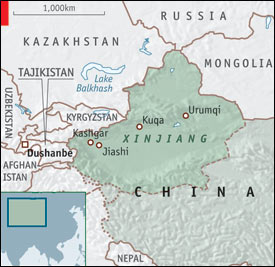On October 6, Federal Judge Ricardo Urbina ordered the release of 17 Uighurs imprisoned at Guantanamo Bay, arguing that the US government had no evidence and no right to hold them as ‘enemy combatants.’ The Bush administration has already stated that these 17 prisoners are not a security threat and conceded that they do not plan on accusing them as enemy combatants anymore. However, Urbina's ruling is being fought by the Bush administration, who fear it will set a precedent for the removal and possible allowance of Guantanamo prisoners into the US homeland as other nations are not likely to want these prisoners.
As we know the Uighurs, who were picked up in Afghanistan/Pakistan, are not going back to China, where they most likely would be welcomed with torture or imprisonment, and most other nations do not desire to anger the Chinese government by taking them on. This leaves the US government with very few choices, one being sending them to small nations that support Taiwan and therefore are already earning China's ire, and secondly letting them come and stay in the US where a network of Uighur immigrants have shown interest in hosting them and smoothing their transition. The US obviously owes these prisoners more than they could ever payback, and a decent life in the US would be a good start, but the Bush administration fears this precedent will force them to admit all of Guantanamo's prisoners in the future.
Now this issue is very controversial and involves some complicated legal dealings and definitions, which I am far from an expert on, but this is an important aspect of US relations with Muslims throughout the world, and obviously in China's Xinjiang Province and Central Asia. Whatever the reasons the US had for arresting these Uighur prisoners now appears to be discredited and the US must fix the situation as soon as possible and this does involve freeing them to a safe location where they can renew their lives. As of right now, their status is still in limbo.
 While I have not discussed legal mandates for holding suspected enemy combatants on this page, I have looked into the Xinjiang's province and its Uighur majority's population battles with the Chinese government and with radical Islam. There is definitely a connection between Uighur human and religious rights and the aftermath of 9/11, one that goes beyond those 17 prisoners. Peter Navarro author of 'the Coming China Wars’ articulately describes how the Chinese government used 9/11 as a Golden Opportunity to get the US to either implicitly or explicitly let their government do what they needed to do to deal with their own ‘Muslim extremists’, the Uighurs in Xinjiang. After 2001, China sped up a Hanification policy for the province, bringing in Han Chinese and deporting Uighur women of birthing age to the factories in the east. Navarro rightly sees this process as radicalizing elements of the Uighur community, which he argues led to the terrorist attacks against Chinese police forces around the Olympics.
While I have not discussed legal mandates for holding suspected enemy combatants on this page, I have looked into the Xinjiang's province and its Uighur majority's population battles with the Chinese government and with radical Islam. There is definitely a connection between Uighur human and religious rights and the aftermath of 9/11, one that goes beyond those 17 prisoners. Peter Navarro author of 'the Coming China Wars’ articulately describes how the Chinese government used 9/11 as a Golden Opportunity to get the US to either implicitly or explicitly let their government do what they needed to do to deal with their own ‘Muslim extremists’, the Uighurs in Xinjiang. After 2001, China sped up a Hanification policy for the province, bringing in Han Chinese and deporting Uighur women of birthing age to the factories in the east. Navarro rightly sees this process as radicalizing elements of the Uighur community, which he argues led to the terrorist attacks against Chinese police forces around the Olympics.
Now this goes back as to how the US, Chinese government, and the world see the situation. Are the Uighurs an oppressed community who's way of life is being stripped from them by a brutal overlord? or Are they tainted by other Muslim extremists in the Middle East and Central Asia region who vow for the destruction of western and modern society? Do both elements exist? To what degree?
Any way one sees the situation, I would argue that the US detainment of these 17 Uighurs could only further the radicalization of their community. If the US government does not have evidence that these 17 individuals were enemy combatants it must find a suitable place for them to freely live, otherwise, it risks alienating the whole Uighur community, a group who is busy trying to fight for their way of life against the Chinese government.
These are complicated issues and conflicts, and in no way am I defending terror attacks by any group, nor do I want to ignore the dilemma the US government finds itself in in dealing with what to do with prisoners in this still new way of warfare. Balancing acts are occurring everywhere: within the US government, regarding what to do with enemy combatants; the Chinese government, with their Hanification and Tibetan policies conflicting with their international presence and stature; and with the Uighur people, who are seeing their way of life being taken away, but with the utilization of terrorist attacks as probably the most effective but inhumane and possibly counterproductive method of achieving autonomy.
(Map Source: Economist)